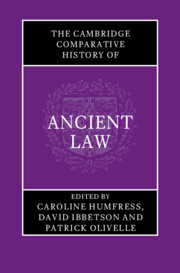Book contents
- The Cambridge Comparative History of Ancient Law
- The Cambridge Comparative History of Ancient Law
- Copyright page
- Contents
- Figures
- Maps
- Contributors
- Preface
- Additional material
- Additional material
- Abbreviations
- Maps
- 1 Orientation
- 2 Law as Text
- 3 Legal Science
- 4 War, Peace and Interstate Relations
- 5 Law and the State
- 6 Law and Religion
- 7 Legal Procedure
- 8 Status and Family
- 9 Crime, Redress and Social Control
- 10 Property
- 11 Commerce and Contracts
- 12 Conclusion
- Bibliography
- Index
8 - Status and Family
Published online by Cambridge University Press: 09 May 2024
- The Cambridge Comparative History of Ancient Law
- The Cambridge Comparative History of Ancient Law
- Copyright page
- Contents
- Figures
- Maps
- Contributors
- Preface
- Additional material
- Additional material
- Abbreviations
- Maps
- 1 Orientation
- 2 Law as Text
- 3 Legal Science
- 4 War, Peace and Interstate Relations
- 5 Law and the State
- 6 Law and Religion
- 7 Legal Procedure
- 8 Status and Family
- 9 Crime, Redress and Social Control
- 10 Property
- 11 Commerce and Contracts
- 12 Conclusion
- Bibliography
- Index
Summary
This chapter surveys forms of status by which legal systems assign rights, obligations and capacities to various categories of person. Though such discussions have tended to restrict themselves to statuses recognized in Roman law (the hierarchical birth-based statuses that Maine contrasted with the contractualism of later Western systems), cross-cultural comparison requires a wider lens. Hence, the chapter covers status within the polity, official or military status, unfree or servile status, putatively ‘natural’ statuses, status in the family and status as member of a voluntary or professional association. Special attention is given to the mechanisms involved in change of status, and to status as a factor in legal penalties. It is proposed that, in systems of religious law (which often operate parallel to civil law in a legal-pluralist context and across borders), status within the ‘ecclesial’ polity is comparable to civil status (citizen, resident alien, etc.) within a territorially defined polity.
- Type
- Chapter
- Information
- The Cambridge Comparative History of Ancient Law , pp. 376 - 445Publisher: Cambridge University PressPrint publication year: 2024

